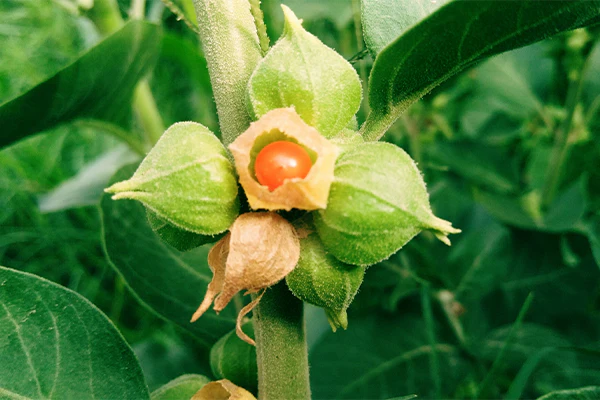What is Ashwagandha?
Ashwagandha (Withania somnifera), also known as Indian ginseng, is an adaptogenic plant that has been used for over 3,000 years in Ayurvedic medicine. Renowned for its anti-stress and revitalising effects, it is now widely used in the form of dietary supplements for its many benefits for the body and mind.
Origin and habitat
Ashwagandha is a plant native to India, North Africa and the Middle East. It grows in arid soils and is mainly cultivated in India and Sri Lanka for its roots and leaves, which concentrate the active ingredients.
Composition and benefits
Ashwagandha contains powerful bioactive compounds called withanolideswhich give it its therapeutic properties.
Main assets :
- Withanolides Adaptogenic and anti-stress action.
- Alkaloids Relaxing and anti-inflammatory effect.
- Saponins Immunomodulating and protective properties.
- Antioxidants Cellular protection against oxidative stress.
Properties and desired effects :
- Reduced stress and anxiety Reduces cortisol levels and improves resistance to stress.
- Improved sleep : Promotes deep, restful sleep.
- Boosting energy and vitality Increases concentration and physical endurance.
- Boosting the immune system Immunomodulatory effect.
- Hormonal support and libido Improves testosterone and fertility in men and balances the hormonal cycle in women.
- Neuroprotective effect Improves memory and cognitive functions.
- Anti-inflammatory properties Helps with chronic pain and inflammation.
Use as a food supplement
Ashwagandha is available in several forms:
- Capsules Precise, practical dosing.
- Powder Mix with drinks (milk, smoothies, herbal teas).
- Liquid extract Rapid assimilation, but strong taste.
Recommended dosage :
- Stress and anxiety 300 to 600 mg per day.
- Sleep and relaxation 300 mg before bedtime.
- Energy and sports performance 500 to 1,000 mg per day.
Precautions and contraindications :
- Pregnant and breast-feeding women Avoid without medical advice.
- People undergoing thyroid treatment May modulate thyroid hormones.
- Interaction with sedative or anxiolytic drugs Risk of potentiation.
- Caution in the event of hypotension Possible hypotensive effect.
Suggested associations
- Stress management and sleep Rhodiola, Magnesium, Lemon balm.
- Physical performance and recovery Ginseng, Spirulina.
- Concentration and memory Bacopa monnieri, Ginkgo biloba.
- Immune support Echinacea, Turmeric.
Sources
- Lopresti AL, Smith SJ. "Ashwagandha as an Adaptogen for Stress and Anxiety Reduction." J Ethnopharmacol 2021.
- Chandrasekhar K, Kapoor J, Anishetty S. "A randomized controlled trial on the anti-stress effects of Withania somnifera." Indian J Psychol Med 2012.
- Raut A, Rege N. "Withania somnifera in Traditional and Modern Medicine: Clinical Applications." J Altern Complement Med 2015.
- Balasubramani SP, Venkatasubramanian P. "Neuroprotective effects of Ashwagandha in cognitive decline." Front Aging Neurosci 2020.











